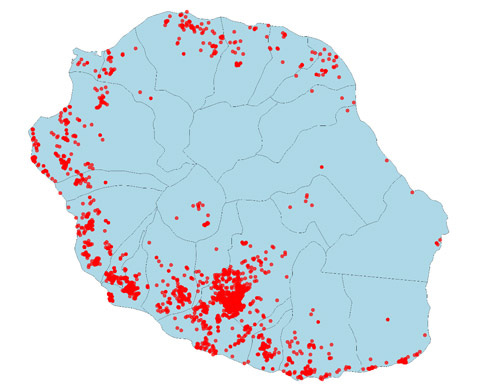Chikungunya epidemic rapidly increasing in La Reunion
1300 additional cases reported the week ending February 23
In a follow-up report, health officials on the island of La Reunion, in the Indian Ocean, reports the chikungunya epidemic is rapidly increasing in the territory.
During the week of February 17 to 23, 2025, Reunion Island recorded 1,300 new cases of chikungunya, an increase of more than 60% compared to the previous week.
From January 1 to February 23, 2025, 3,245 cases of indigenous chikungunya were reported in Reunion. And 3,390 cases since August 2024.
Officials say this increase corresponds to the period preceding the passage of cyclone Garance. This could have ambivalent effects on the development of the virus, positive on the one hand due to the leaching effect of ravines that it could cause in the short term, but also negative due to the risk of an increase in stagnant water.
The people of Reunion are encouraged to take the right steps to prevent the proliferation of mosquitoes.
Before the passage of Cyclone Garance, a strong progression of the epidemic was observed, especially in the cities of Tampon and Étang-Salé. Les Avirons, Petite-Île, Saint-Philippe, Saint-Louis, Saint-Paul, Saint-Leu, La Possession and Trois-Bassins also recorded a significant increase in cases.
Chikungunya disease is caused by the chikungunya virus and is spread to humans through mosquito bites. Outbreaks have occurred in countries in Africa, Americas, Asia, Europe, the Caribbean, and Indian and Pacific Oceans.
Most people infected with chikungunya virus develop some symptoms. Symptoms of chikungunya usually begin 3–7 days after a bite by an infected mosquito. The most common symptoms are fever and joint pain. Other symptoms may include headache, muscle pain, joint swelling, or rash. Most people get better within a week; however, some can have severe joint pain for months to years following acute illness.
People at risk for more severe disease include newborns infected around the time of birth, older adults (65 years or older), and people with medical conditions such as high blood pressure, diabetes, or heart disease. Death from chikungunya is rare.
There is no specific treatment for chikungunya; however, the Advisory Committee on Immunization Practices (ACIP) recommends a vaccine for some travelers.






